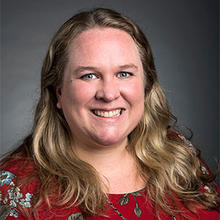- September 22, 2022
Exceptions may prove the rule, but they must first be explained. That is why finance researchers are drawn to the distress anomaly-- a well-documented phenomenon that challenges the risk-return paradigm in equity markets. Generally, higher-risk investments are expected to yield higher returns than safer, more stable securities. In recent years, however, studies have shown that high-credit-risk securities for companies in distress – i.e. when their already-low credit rating is being downgraded -- realize abnormally low returns compared to non-distressed securities of the same or lower risk. Academics have proposed a range of rationales for this puzzle. Alexander Philipov, finance area chair and associate professor at George Mason University, says they mainly fall into two categories.
- September 20, 2022
Selling is inseparable from relationship management. In the past, the one-to-one "human touch" of a salesperson compensated for the standardized nature of their wares. However, today's sales environment tends towards customized solutions and co-creation with the client, especially in the B2B space. In many cases, these trends have greatly increased the network of stakeholders whom salespeople are obliged to keep happy. Research shows that B2B customers benefit from being more involved in the process, but what about the sales force? Does their increased interpersonal burden translate to higher risk of burnout? George Mason University School of Business Marketing Area Chair Jessica Hoppner's recently published paper in Industrial Marketing Management, co-authored by Paul Mills of Cleveland State University and David A. Griffith of Texas A&M University, finds some surprising answers.
- September 14, 2022
Today's workforce might best be described in terms of tumult: Great Resignation, Great Retirement, Great Reshuffle, etc. In this "new normal," managers must learn to navigate a state of continual transition in their teams and organizations, while keeping up with day-to-day demands. Likewise, George Mason University School of Business Management Professors Sarah Wittman and Kevin Rockmann believe that it is time for scholars to change the way they think about role transitions to better align their theories with our increasingly uncertain world.
- September 8, 2022
We’ve all become familiar with the pandemic-related reasons behind the upheaval in the labor market, as well as the standard-issue solutions like trying to infuse work with purpose or offering employees remote working. While these are practical suggestions, they have not restored stability to the workforce. It is our contention that any broad-brush advice for retaining employees in the current environment will be insufficient. Whether managers like it or not, employees will demand sensitivity and adjustment to their psychological needs as individuals.
- August 29, 2022
George Mason University announced today that the Center for Retail Transformation at the university’s School of Business has entered into a partnership with TruRating, a customer experience and insights company with offices in London, Atlanta, and Sydney.
- August 30, 2022
In her 2021 PhD dissertation, Ashley Yuckenberg, a trained journalist and assistant professor of business communications at Mason, plumbs the ethical quandaries of crisis coverage—and provides a framework for guiding journalists through them.
- August 16, 2022
Long before COVID was a household word, Dr. Ajay Vinzé, now dean of Mason’s business school, helped pioneer a collaboration with public-health officials in Maricopa County, Arizona, to help predict possible outcomes of various interventions as part of research on pandemic response. Vinzé calls this nearly decade-long partnership “a major part of my research and professional journey.”
- July 21, 2022
Hierarchy has its upsides and downsides. A pyramidical power structure works well for day-to-day decision making. But as the distance between the base and the tip of the pyramid increases, tensions between organizational tiers can create obstacles to reform. It’s a matter of “the unconscious dynamics of humans in groups and systems” rather than a deliberate response, says Renee Rinehart Kathawalla, a postdoctoral research fellow of management at Mason.
- July 11, 2022
Rashed Hasan, executive-in-residence at George Mason University’s Business for a Better World Center (B4BW), is working to make transparent metrics and benchmarks that accurately represent stakeholder value a reality. Alongside a group of researchers and business advisors, he’s developing the Stakeholder Value Index (SVI), which he hopes will be a reliable framework for measuring business impact across the five stakeholders mentioned in the BRT Statement, as well as two additional stakeholders: the company itself and the planet.
- June 22, 2022
Gregory Unruh, academic director of Mason’s brand-new chief sustainability officer certification program in Executive Development, has been training sustainability leaders for decades.










